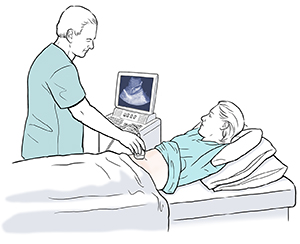If you’ve had bleeding early in your pregnancy, you’re not alone. Many other pregnant women have early bleeding, too. And in most cases, nothing is wrong. But your healthcare provider still needs to know about it. They may want to do tests to find out why you’re bleeding. Call your provider if you see bleeding during pregnancy. Tell your provider if your blood is Rh negative. Then they can figure out if you need anti-D immune globulin treatment.
What causes early bleeding?
The cause of bleeding early in pregnancy is often unknown. But many factors early on in pregnancy may lead to light bleeding (called spotting) or heavier bleeding. These include:
-
Having sex
-
When the embryo implants on the uterine wall
-
Bleeding between the sac membrane and the uterus (subchorionic bleeding)
-
Pregnancy loss (miscarriage)
-
The embryo implants outside of the uterus (ectopic pregnancy)
If you see spotting
Light bleeding is the most common type of bleeding in early pregnancy. If you see it, call your healthcare provider. Chances are, they will tell you that you can care for yourself at home.
If tests are needed
Depending on how much you bleed, your healthcare provider may ask you to come in for some tests. A pelvic exam, for instance, can help see how far along your pregnancy is. You also may have an ultrasound or a Doppler test. These imaging tests use sound waves to check the health of your baby. The ultrasound may be done on your belly or inside your vagina. You may also need a special blood test. This test compares your hormone levels in blood samples taken 2 days apart. The results can help your provider learn more about the implantation of the embryo. Your blood type will also need to be checked to assess if you will need to be treated for Rh sensitization.
Warning signs
If your bleeding doesn’t stop or if you have any of the following, get medical care right away:
-
Soaking a sanitary pad each hour
-
Bleeding like you’re having a period
-
Cramping or severe belly pain
-
Feeling dizzy or faint
-
Tissue passing through your vagina
-
Bleeding at any time after the first trimester
Questions you may be asked
Bleeding early in pregnancy isn't normal. But it is common. If you’ve seen any bleeding, you may be concerned. But keep in mind that bleeding alone doesn’t mean something is wrong. Just be sure to call your healthcare provider right away. They may ask you questions like these to help find the cause of your bleeding:
-
When did your bleeding start?
-
Is your bleeding very light or is it like a period?
-
Is the blood bright red or brownish?
-
Have you had sex recently?
-
Have you had pain or cramping?
-
Have you felt dizzy or faint?
Monitoring your pregnancy
Bleeding will often stop as quickly as it began. Your pregnancy may go on a normal path again. You may need to make a few extra prenatal visits. But you and your baby will most likely be fine.


